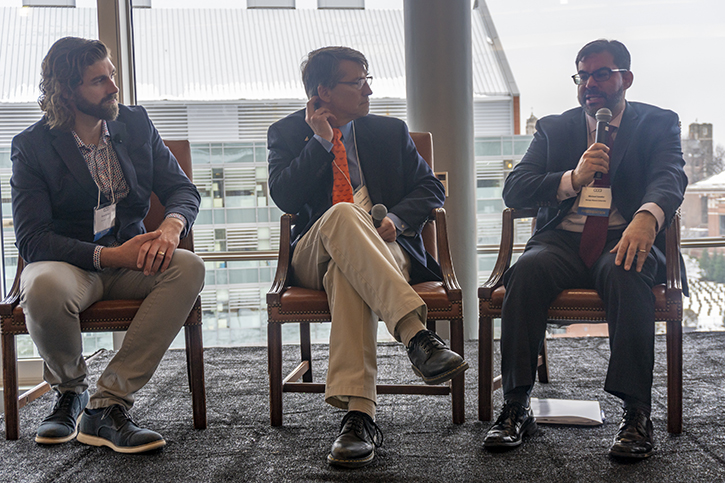
Mason's Director of Strategic Communications, Michael Sandler (right), recently joined communicators from Virginia Tech at the College Communicators Association Winter Conference to discuss how they prepared for Amazon's announcement with little advance warning. Photo by John Hollis.
How do you prepare for a major announcement involving your university when you don’t know when it is coming—or if it is coming at all?
That was the challenge faced by communication leaders at George Mason University and Virginia Tech, two universities that helped the commonwealth land Amazon. The tech giant announced in November that Crystal City would be one of two sites for its second corporate headquarters, choosing it from more than 300 competing cities and regions.
Speaking to communicators from 32 colleges and universities from Virginia, Maryland and Washington, D.C., along with media, at the College Communicators Association Winter Conference at Georgetown University, Michael Sandler, Mason’s director of strategic communications, and Mark Owczarski, Virginia Tech’s assistant vice president for university relations, explained how both universities prepared for the announcement of the decision, for which they had little advance warning.
Sandler said that university leadership had hoped that Northern Virginia would be chosen and had worked closely with the Virginia Economic Development Partnership on a proposal since the summer of 2017. Then, in mid-October, there was some buzz that Northern Virginia was in the running, particularly after a New York Times story said that it“checked all the boxes.”
“There was a lot of excitement, but we didn’t know when it was coming or if Amazon would really happen,” Sandler said during the panel discussion. “What we did know is that part of our DNA is to be a driver of innovation in the region, so we began to prepare.”
In mid-October, Sandler and others in the Office of Communications and Marketing began working with university leadership on core messages that outlined the university’s plans to support Amazon and identifying spokespeople who could best tell the story. Additionally, the communications team tracked media reports to identify reporters covering the story and began a soft outreach to offer university leadership for interviews. The Office of Communications and Marketing also began discussing a targeted advertising campaign.
The team’s efforts helped position Mason President Ángel Cabrera for interviews on the day the company announced it chose Northern Virginia, Sandler said. Cabrera did dozens of interviews with major media outlets in the ensuing days, including The Washington Post, the New York Times, The Wall Street Journal, the Chronicle of Higher Education, CNN and Forbes. An email message from Cabrera announcing the news was delivered to the university community. That was followed by a personal video message from Cabrera.
Virginia Tech likewise did its due diligence in advance, Owczarski said, but faced an added challenge. The school wanted to bring a large presence from Blacksburg to the governor’s press conference when Amazon announced. Being hours away, the school would need to secure hotel rooms the night before. But without knowing when—or if—Amazon would announce Northern Virginia, the school couldn’t identify a date. So Owczarski said they reserved rooms, then canceled those reservations and reserved more, continuing that process until the selection was finalized.
“It was reading media reports and what people were speculating, because Amazon kept it close to the vest,” he said.
The region’s higher education played a key role in Amazon’s decision. It was the state’s willingness to invest in higher education, particularly in the tech sector, to ensure a pipeline of career-ready graduates, that played a significant role in Amazon’s decision to come to Northern Virginia, The Washington Post wrote after the announcement.
